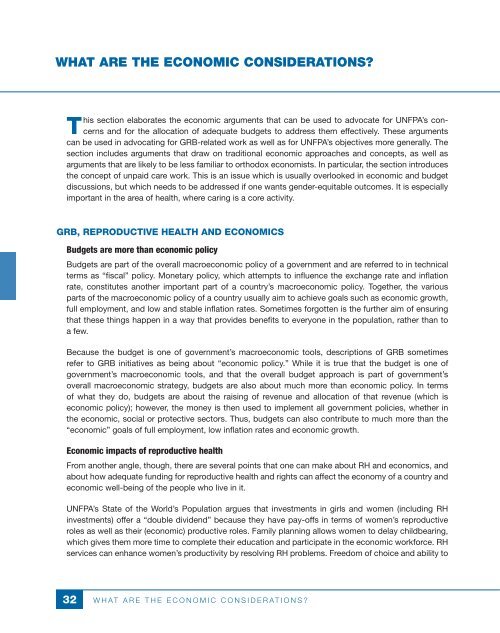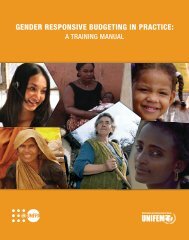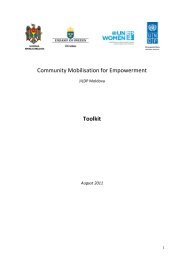Gender Responsive Budgeting and Women's Reproductive Rights ...
Gender Responsive Budgeting and Women's Reproductive Rights ...
Gender Responsive Budgeting and Women's Reproductive Rights ...
Create successful ePaper yourself
Turn your PDF publications into a flip-book with our unique Google optimized e-Paper software.
What are the economic considerations?This section elaborates the economic arguments that can be used to advocate for UNFPA’s concerns<strong>and</strong> for the allocation of adequate budgets to address them effectively. These argumentscan be used in advocating for GRB-related work as well as for UNFPA’s objectives more generally. Thesection includes arguments that draw on traditional economic approaches <strong>and</strong> concepts, as well asarguments that are likely to be less familiar to orthodox economists. In particular, the section introducesthe concept of unpaid care work. This is an issue which is usually overlooked in economic <strong>and</strong> budgetdiscussions, but which needs to be addressed if one wants gender-equitable outcomes. It is especiallyimportant in the area of health, where caring is a core activity.GRB, reproductive health <strong>and</strong> economicsBudgets are more than economic policyBudgets are part of the overall macroeconomic policy of a government <strong>and</strong> are referred to in technicalterms as “fiscal” policy. Monetary policy, which attempts to influence the exchange rate <strong>and</strong> inflationrate, constitutes another important part of a country’s macroeconomic policy. Together, the variousparts of the macroeconomic policy of a country usually aim to achieve goals such as economic growth,full employment, <strong>and</strong> low <strong>and</strong> stable inflation rates. Sometimes forgotten is the further aim of ensuringthat these things happen in a way that provides benefits to everyone in the population, rather than to .a few.Because the budget is one of government’s macroeconomic tools, descriptions of GRB sometimesrefer to GRB initiatives as being about “economic policy.” While it is true that the budget is one ofgovernment’s macroeconomic tools, <strong>and</strong> that the overall budget approach is part of government’soverall macroeconomic strategy, budgets are also about much more than economic policy. In termsof what they do, budgets are about the raising of revenue <strong>and</strong> allocation of that revenue (which iseconomic policy); however, the money is then used to implement all government policies, whether inthe economic, social or protective sectors. Thus, budgets can also contribute to much more than the“economic” goals of full employment, low inflation rates <strong>and</strong> economic growth.Economic impacts of reproductive healthFrom another angle, though, there are several points that one can make about RH <strong>and</strong> economics, <strong>and</strong>about how adequate funding for reproductive health <strong>and</strong> rights can affect the economy of a country <strong>and</strong>economic well-being of the people who live in it.UNFPA’s State of the World’s Population argues that investments in girls <strong>and</strong> women (including RHinvestments) offer a “double dividend” because they have pay-offs in terms of women’s reproductiveroles as well as their (economic) productive roles. Family planning allows women to delay childbearing,which gives them more time to complete their education <strong>and</strong> participate in the economic workforce. RHservices can enhance women’s productivity by resolving RH problems. Freedom of choice <strong>and</strong> ability to32W h a t a r e t h e e c o n o m i c c o n s i d e r a t i o n s ?





